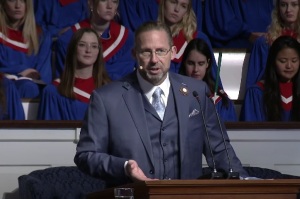Rebuffing U.S. and Israel, Palestinians Vow to Press Ahead for Statehood
Ignoring threats by the United States to veto his plea for Palestinian statehood recognition at the United Nations Security Council in New York next week, President Mahmoud Abbas has vowed to press ahead, insisting such a move is the only viable option after decades of failed peace negotiations with Israel.
Speaking at his headquarters in Ramallah in the West Bank Friday, Abbas said he would be seeking acknowledgement of a Palestinian state at the U.N. Security Council meeting, saying, "We need to have full membership at the U.N. ... We need a state, a seat at the United Nations."
“We are going to the Security Council," Abbas said. "[It is] our decision, which we have conveyed to everyone. It is our legitimate right to demand the full membership of the state of Palestine in the U.N."
U.S., Israel and European diplomats have attempted to dissuade the Palestinian leadership from pursuing such a course, insisting a Palestinian bid for statehood would only inflame already existing tensions in the Middle East.
President Barack Obama's administration has been working to broker a peace agreement between Israel and the Palestinian leadership, and has vowed to veto any application for statehood submitted to the United Nations.
If the application for statehood is received by the U.N. and the U.S. makes good on its promise to vote against the Palestinians' request, the Obama administration's reputation in the Middle East would undoubtedly take a blow, political observers warn.
The Obama administration has been seeking to align itself in a favorable light amid the recent upheavals in North Africa in countries like Libya and Egypt.
Abbas' announced intention of a statehood application essentially forces the administration into a corner, experts insist.
Israeli Prime Minister Benjamin Netanyahu's office released a statement Friday, in response to Abbas' announcement, saying, "Peace will not be achieved by a unilateral approach to the United Nations."
Netanyahu has said repeatedly that a Palestinian state should only be pursued through negotiations.
Abbas said his application to the U.N. would include a demand for recognition of a state along the borders of Israel prior to the 1967 war, with East Jerusalem as its capital – territory which Israel says is not up for grabs.
Although Abbas made it clear that his face was firmly set toward the U.N., he called for Palestinians to remain sensible and not become too excited.
"We are not going to bring independence," he cautioned. "Let's not exaggerate. We will continue to negotiate."
Abbas, who was expected to personally submit the application himself to U.N. Security-General Ban Ki-Moon, added, "[We will be] carrying an olive branch with us."
He aded, "When I have finished delivering my speech, I will submit the request for membership to the Secretary General to be passed to the president of the Security Council."
"It is our legitimate right to demand the full membership of the state of Palestine in the UN," he said. "To put an end to a historical injustice by attaining liberty and independence, like the other peoples of the earth, in a Palestinian state on the borders of June 4, 1967."
Both Abbas and Netanyahu were expected to speak at next week's U.N. meeting, scheduled to take place on Sept. 23.
If Abbas' bid fails in the U.N. Security Council, the Palestinian government could turn to the General Assembly for a majority vote, CNN reports.
However, if the Palestinian application for recognition is approved the leadership could then pursue legal actions against Israel.
Abbas' plan could also backfire, The New York Times reports, if the Security Council determines that the Palestinians are unable to prove that they constitute a state.
Israeli has reportedly stepped up its security in the region, expecting demonstrations when the Palestinians submit their application for statehood recognition next week.





























